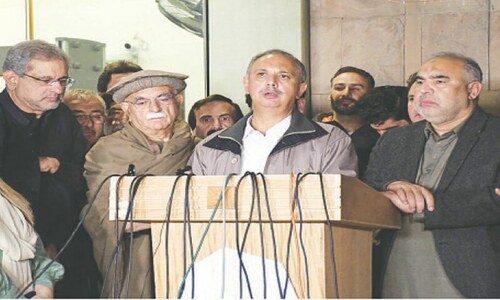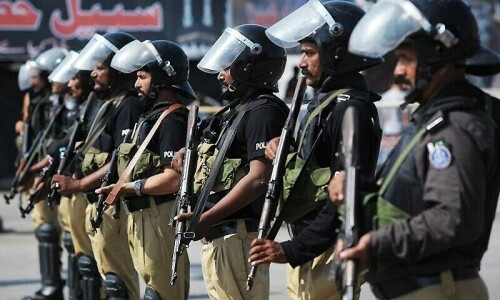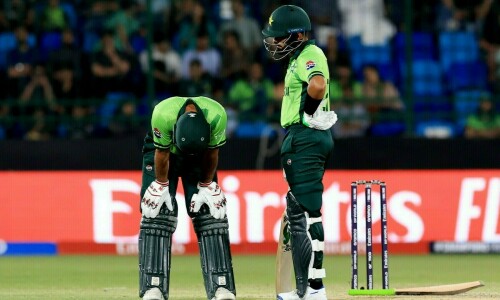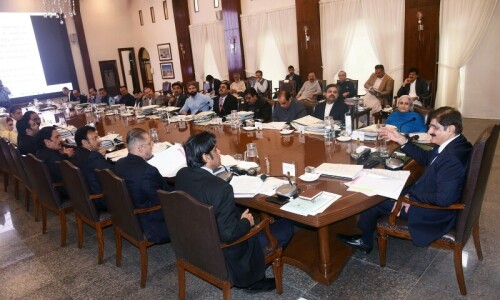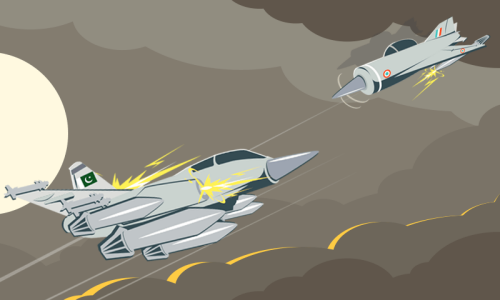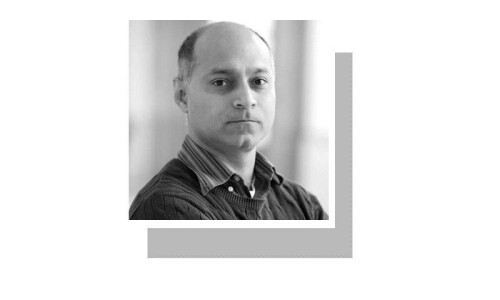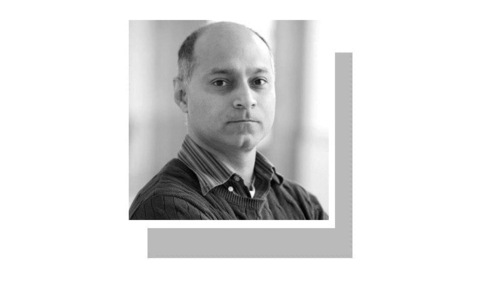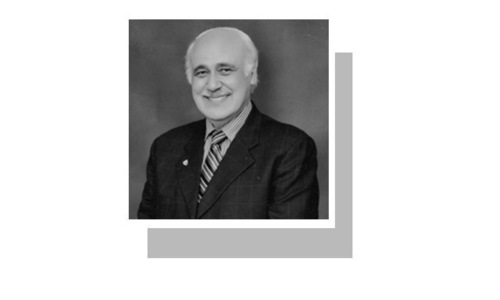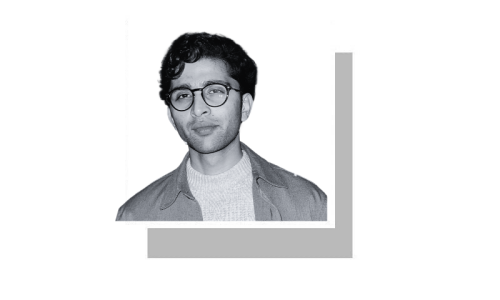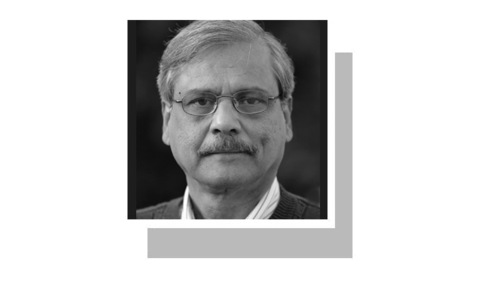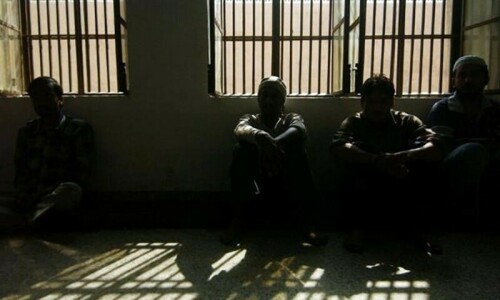THE first impression that one gets after seeing Nawaz Sharif is that he is not a man in a hurry. He is at ease with himself, somebody who has gained weight, physically and politically, not to mention a full head of hair.
He seems to have realised that he is once again in the power game. It may take longer than he would like, but surely, sooner or later, he will get another chance to make it to that place up on the hill from where he was sacked unceremoniously over eight years ago.
He struggled back from a position where merely coming back to Pakistan was an achievement. Since then he is definitely going from strength to strength. Even his worst in the coming election may not be so bad. His aides are confident that the PML-N would be the biggest party in the National Assembly after the PPP by winning at least 70 seats.
Nawaz Sharif seems to have reconciled himself to not being anointed king this time. But he surely has a chance to become the king-maker.
And who knows if his stars continue to be as blessed as they are, a time may come when he decides the premiership for a possible national government.
The good thing is that he is focused on issues. He is taking a clear stance on the reinstatement of judges, unlike the PPP’s dilly-dallying on the issue.
In a recent meeting with Nawaz Sharif at his residence in Lahore it was obvious that he realises the political potential of the judges issue. It has a popular appeal and also endears him to the legal community. Even those lawyers who are PPP members acknowledge Mr Sharif’s categorical support.
He also seemed aware of the new media, the new judiciary and the new (civil society). That’s why among the first things that he did after his return was to call on Justice Ramday. The message that we got in Ittefaq Lane was: who knows this might lead to the new army that the new chief is promising us in the new environment. Let, as they say, old be sold.
He wants to strengthen the public perception that he is, ironically Bhutto-like — a defiant and anti-status quo politician. He realises that he became a politician the day he defied the good old Ghulam Ishaq Khan by refusing to take his “dictation”.
“We want to play it like a test match,” one of his confidantes shared his views during a recent visit to Lahore. “We know we are here to stay so that’s why we are done with old style of power play. We are seeking permanence in politics that only issues-based politics can bring.”
Contradiction comes when people try to mix liberal politics with righteous leanings. In fact, one of the PML-N’s ‘bads’ is the fears about its leaning too much to the right. This can be disastrous, considering the growing Talibanisation in the country.
The party has in its fold people with dubious credentials. For instance, one of the speech writers is almost a modern-day version of Nasim Hijazi. He was actually given an honorary sash (dastarbandi) in Akora Khattak’s famous madressah, which has provided the biggest number of mujahideen. We came across another gentleman during our meeting with the Sharif brothers who was proud of having served in the Afghan jihad. He was bragging, naively I would say, “the mujahids still come to me from Wana (Waziristan).” Perhaps, the presence of Pervaiz Rashid and a liberalised Shahbaz Sharif may balance things out for such elements.
Some estimates suggest that the PML-N may win anywhere between 45 and 55 National Assembly seats, most of them from Punjab. Although Nawaz Sharif has a national appeal, Benazir’s assassination has affected his party’s national character. It will be lucky to get even a single seat in Sindh, while the labyrinthine politics of Balochistan and the NWFP is not likely to fetch them more than five seats.
The battleground remains the Punjab, where they are fighting for their share of the electoral pie in a triangular contest with the PPP and the PML-Q. Surprisingly, PML-N seems well placed in the south of Punjab, traditionally a PPP stronghold from where most of the Patriot turncoats emerged in the last elections.
They have a fair chance of winning, according to analysts, 15 out of the 53 seats in the Saraiki heartland. Among the winnable candidates, Sanaullah Mastikhel and Akhtar Kanju have joined the party after leaving PML-Q. Other strong candidates include Afzal Dhandla, Tahir Sultan, Asad Gilani, Mohammad Khan Daha, Saifuddin Khosa.
The surprises may be in the battle between Saud Majid and Pervaiz Elahi in Bahawalpur and between Hafiz Abdul Karim and Farooq Leghari in D. G. Khan.But PML-N’s strong point remains the Punjab cities, where chances of rigging are less. In Lahore alone, Nawaz Sharif expects to win a minimum of 10 seats. The losers might include Hamayun Akhtar.
But the real battle is for the chief ministership of Punjab, which may be the most important seat after the premiership.
No wonder Shahbaz tries to confine himself to Punjab. In our meeting in Lahore he was overly conscious in not allowing any confusion about the question of leadership.
Nawaz Sharif is “my leader,” that’s about it. It might suit him in the end as the real battle for the PML-N is for Punjab, where they have better prospects than in Islamabad.
The fact is that PML (N) could have performed better if it had accepted all the turncoats back. So far, the policy is that they will take back only those who did not go overboard against the party. Nawaz Sharif has been extra generous on many counts.
Another bad thing is that Mian Saheb has started relenting on the loyalty issue.
The argument is that if you can relent on one issue, the chain might extend to others too.
It started with Saeed Mehdi. In Nawaz Sharif’s recent press conference in Islamabad Mr Mehdi was again giving an impression that he was principal secretary, a post that he held till that fateful day of Oct 12, 1999. It was surprising for me because I had had the opportunity to be a silent participant in a dinner meeting where Saeed was trying to convince a known crony of the president that he had no involvement in the Oct 12 incident.
This was the time when an old friend in the bureaucracy had got him rescued and he was exploring his future in the new regime. The gist of his argument was that he had tried to stop Nawaz Sharif on everything that he did wrong. The good things, of course, like the appointment of Gen Musharraf as COAS, were done on his great advice.
Saeed is just the first among a long line of deserters that may be accepted. Zafarullah Jamali, whose vitriolic statements against the brothers are part of the official record, stands almost accepted. In the given trend, the next might be (horror of horrors) Saifur Rehman, then may be Mushahid Hussain, with the beeline ending at Sheikh Rashid.
If that be the case, one might say, why not accept Pervaiz Elahi.


